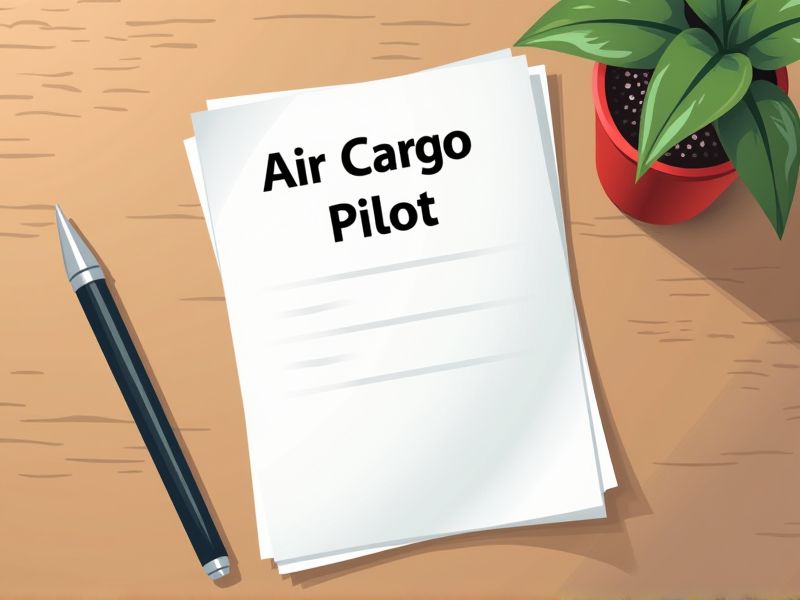
Air cargo pilots require specific certifications due to stringent industry safety standards and regulations. Certification ensures pilots possess the necessary skills to handle diverse cargo, including hazardous materials and oversized loads, safely and efficiently. It also guarantees pilots understand international and national airspace regulations, crucial for global logistics operations. Here are key certifications essential for becoming an air cargo pilot.
Airline Transport Pilot License (ATPL)
Air Cargo Pilots require an Airline Transport Pilot License (ATPL) because it is the highest level of aircraft pilot certification, ensuring they possess advanced knowledge and skills needed for handling complex cargo tasks. The license demonstrates expertise in piloting large aircraft, which is crucial for safely transporting heavy and potentially hazardous materials. Stringent regulatory requirements mandate an ATPL to assure all cargo operations adhere to international safety standards. Obtaining an ATPL typically necessitates extensive flight experience, which equates to higher competency in managing the varied challenges encountered in air cargo transport.
Commercial Pilot License (CPL)
Possessing a Commercial Pilot License (CPL) is mandatory for an air cargo pilot as it certifies the holder has the essential skills and knowledge to operate an aircraft under commercial regulations. The CPL ensures compliance with strict aviation safety standards required to transport goods efficiently. When a pilot holds a CPL, they have undergone rigorous training that includes night flying, instrument hours, and technical navigation, crucial for cargo operations. Insurance companies and employers often require CPL certification to mitigate risks and ensure proficiency in handling unexpected situations.
Instrument Rating (IR)
Obtaining an Instrument Rating (IR) enables an air cargo pilot to navigate efficiently through bad weather conditions, reducing delays and ensuring timely deliveries. This qualification enhances pilot proficiency in instrument flight rules (IFR), vital for operations when visual references are inadequate. The rating also expands the pilot's employment opportunities, as many cargo operations require flights at all hours, often encountering varied weather conditions. Holding an IR increases the safety margins, minimizing risks associated with spatial disorientation and controlled flight into terrain incidents.
Multi-Engine Rating (MER)
A Multi-Engine Rating (MER) is important for an air cargo pilot because the majority of cargo aircraft are multi-engine, providing the required experience and qualifications to operate these aircraft effectively. Multi-engine planes offer increased power and payload capacity, essential for transporting larger quantities of cargo efficiently. Safety considerations also demand a pilot adept in multi-engine operations, as additional engines provide redundancy, increasing safety margins in case one engine fails. Airlines prioritize hiring pilots with MER due to their ability to handle complex systems inherent in multi-engine aircraft, reducing operational risk and ensuring timely, reliable cargo delivery.
Type Rating for specific aircraft
Air cargo pilots require a type rating for specific aircraft to ensure they are proficient in handling unique operational characteristics. Different aircraft models have varying cockpit layouts and system intricacies, demanding specialized knowledge. Type ratings enhance flight safety by certifying that pilots have undergone rigorous training for the aircraft they will operate. Regulatory bodies mandate type ratings to standardize pilot proficiency and maintain industry safety standards.
Flight Safety and Crew Resource Management Certification
Flight Safety and Crew Resource Management Certification is crucial for air cargo pilots because it enhances their ability to handle emergency situations effectively. The certification ensures that pilots possess essential communication and teamwork skills, vital for coordinating with ground staff and crew members. A certified pilot is more adept at making informed decisions, reducing the risk of accidents and improving overall operational safety. With the increasing complexity and scale of air cargo operations, certified pilots contribute to streamlined efficiency and compliance with aviation regulations.
Aviation Security Awareness Certification
Aviation Security Awareness Certification is needed for air cargo pilots due to increasing global threats, ensuring they understand critical security protocols. Without this certification, pilots might inadvertently bypass essential safety measures, increasing the risk of unlawful interference with aircraft operations. This certification equips pilots to recognize and respond to potential threats, protecting both people and goods in transit. Regulatory bodies mandate such certifications to maintain consistent security standards across the aviation industry.
Advanced Navigation Systems Certification
Advanced Navigation Systems Certification ensures air cargo pilots are proficient in handling complex navigation technologies, enhancing flight safety. This certification contributes to efficient route planning and fuel management, consequently reducing operational costs for airlines. Rigorous training associated with the certification prepares pilots to react effectively to unforeseen navigation challenges, minimizing risks during flights. Regulatory compliance requires such certification, ensuring pilots meet industry standards for international cargo operations.
Hazardous Materials (HAZMAT) Handling Certification
Hazardous Materials Handling Certification for air cargo pilots ensures the safe transportation of dangerous goods, minimizing the risk of incidents during flight. The certification mandates pilots to understand specific safety protocols and regulations set by aviation authorities. Knowledge in handling hazardous materials allows pilots to effectively manage emergency situations, safeguarding both crew and passengers. The certification also ensures compliance with international and domestic laws, avoiding legal penalties and maintaining global safety standards.
Safety Management Systems (SMS) Training Certification
Safety Management Systems (SMS) Training Certification is necessary for air cargo pilots due to the need for standardized safety protocols that mitigate operational risks. Aspects of air cargo operations, such as handling dangerous goods, require pilots to be well-versed in SMS to ensure both compliance and safety. The certification helps pilots to effectively identify and address potential hazards through data-driven decision-making processes. The growing complexity of air cargo operations demands enhanced safety strategies, making SMS Training Certification an essential component of pilot education.
Summary
By obtaining certifications, you enhance your qualifications and demonstrate a commitment to aviation standards. This often leads to increased job opportunities and potentially higher salaries, reflecting your advanced skills. Certification can expand your ability to operate more diverse aircraft and routes. Employers may also view you as a more reliable asset, potentially leading to career advancement opportunities.
